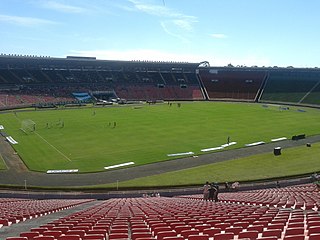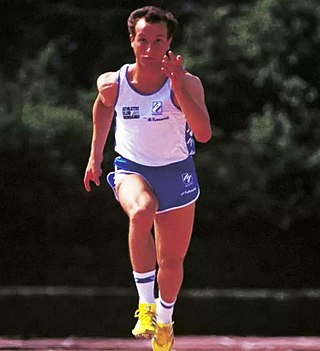
Mestalla Stadium is a football stadium in Valencia, Spain. The stadium is the home of Valencia and has a capacity of 49,430 seats, making it the 8th-largest stadium in Spain, and the largest in the Valencian Community. The stadium's name originates from the historic irrigation canal of Mestalla, which was developed and consolidated during the Arab dynasty between the 10th and 11th centuries, and was originally outside the south stand of the stadium where it had to be jumped over in order to get to the ground. The North Stand of the stadium is known for its very steep section.

The Estádio Municipal Parque do Sabiá, also known as Parque do Sabiá, is a multi-use stadium in Uberlândia, Brazil. It is currently used mostly for football matches. It is the home ground of Uberlândia Esporte Clube and Clube Atlético Portal, and is the biggest stadium in Minas Gerais state countryside. The stadium was built in 1982 and is able to hold 53,350 people. It is owned by the Uberlândia City Hall.

Sabiaceae is a family of flowering plants that were placed in the order Proteales according to the APG IV system. It comprises three genera, Meliosma, Ophiocaryon and Sabia, with 66 known species, native to tropical to warm temperate regions of southern Asia and the Americas. The family has also been called Meliosmaceae Endl., 1841, nom. rej.
Michael John Sabia is a Canadian businessman and civil servant. From 2009 until January 2020, Sabia was president and CEO of Caisse de dépôt et placement du Québec. He previously was CEO of BCE Inc. from 2002 to 2008. In November 2019, the University of Toronto's Munk School of Global Affairs and Public Policy announced that Sabia would be its new director. He was in that role from February to December 2020, when he was appointed by the Government of Canada as Deputy Minister of Finance.
Laura Sabia, was a Canadian social activist and feminist.

The Sinatra–Jobim Sessions is a 1979 double LP compilation album of American singer Frank Sinatra's work with Antônio Carlos Jobim. The album was published only in Brazil by producer Roberto Quartin, and had never been re-released on vinyl or CD until 2010 when it was re-mastered and released under The Frank Sinatra Collection and became available worldwide.
The 1995 South American Women's Football Championship was held in Uberlândia, Brazil between 8 and 22 January. It was the second staging of the South American Women's Football Championship and determined the CONMEBOL's single qualifier for the 1995 FIFA Women's World Cup. Only five national teams took part in the tournament.

Donato Sabia was an Italian middle-distance runner who specialized in the 800 metres.
Eli Sabiá Filho is a Brazilian professional footballer who plays as a centre-back for I-League club Sreenidi Deccan.
Brazilian hemorrhagic fever (BzHF) is an infectious disease caused by Brazilian mammarenavirus, an arenavirus. Brazilian mammarenavirus is one of the arenaviruses from South America to cause hemorrhagic fever. It shares a common progenitor with Argentinian mammarenavirus, Machupo mammarenavirus, Tacaribe mammarenavirus, and Guanarito mammarenavirus. It is an enveloped RNA virus and is highly infectious and lethal. Very little is known about this disease, but it is thought to be transmitted by the excreta of rodents. This virus has also been implicated as a means for bioterrorism, as it can be spread through aerosols.

Estadio Municipal Reino de León is a football stadium located in León, in the autonomous community of Castile and León, Spain. It is the home stadium of Cultural Leonesa, with a capacity of 13,346 seats.

Sinatra/Jobim: The Complete Reprise Recordings is a 2010 compilation album by Frank Sinatra, consisting of 20 tracks he recorded with the Brazilian musician Antônio Carlos Jobim.
Sabia Dreptății was one of the organized anti-Soviet groups in Bălți, Bessarabia.
Ion Moraru was a Moldovan activist and author. He was a founder of the anti-Soviet group Sabia Dreptății and a political prisoner in the Soviet Union.

Joe Sabia is an American filmmaker and digital content producer. He is best known as the creator and voice of "73 Questions", a rapid-fire one-take digital series featuring celebrities that he developed for Vogue in 2014. Sabia was named the Senior Vice President of Creative Development at Condé Nast Entertainment after the release of the first video with Sarah Jessica Parker. In 2024, he directed his first feature film Federer: Twelve Final Days for Amazon Studios on the retirement of Roger Federer from tennis.

The SABIA-Mar, originally called SAC-E by CONAE, is a dual satellite joint Earth observation mission. The mission objective is to study the oceanic biosphere, its changes over time, and how it is affected by and reacts to human activity. It will focus on the monitoring of ocean surfaces, especially studying the ocean ecosystem, the carbon cycle, and marine habitats, as well as ocean mapping.
"Sabiá" is a Brazilian song composed in 1968 by Antônio Carlos Jobim, with lyrics by Chico Buarque. English-language lyrics were written later by Norman Gimbel.
The Torneio Rei Dadá, was a friendly tournament organized by municipality of Uberlândia to celebrate the reopening of the Estádio Parque do Sabiá. The name of the competition was a tribute to Dadá Maravilha, one of the greatest players of the Minas Gerais football history.
The 1995 Copa dos Campeões Mundiais was the first competition realized in Brazil, between all the Brazilian clubs winners of the Intercontinental Cup.










